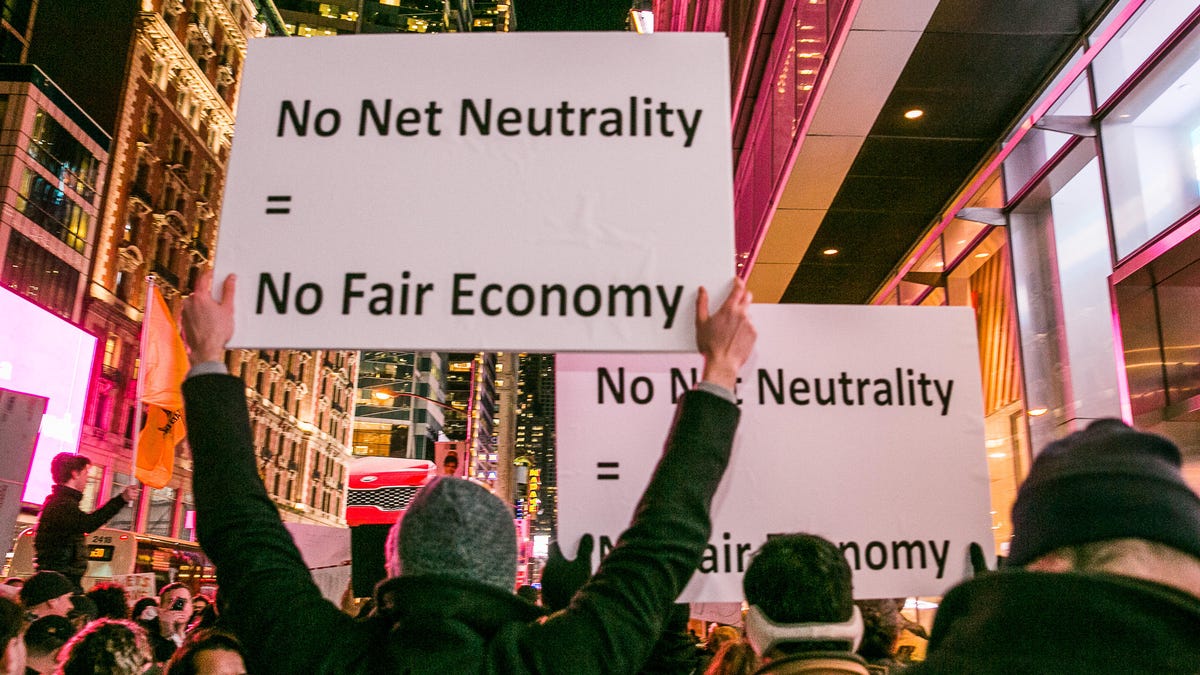California, Washington, NY take steps after net neutrality vote
After the FCC voted down the Obama-era rules, lawmakers and attorneys general in three states say they're ready to fight.

Several states, including California, Washington and New York, plan fight the FCC's net neutrality repeal.
The Federal Communications Commission may have voted to roll back net neutrality rules, but some state lawmakers and attorneys general say they'll battle the feds to make sure online traffic is treated equally.
Politicians from California, Washington and New York said Thursday they'll use a mix of legislative action and legal moves to fight the FCC's repeal of net neutrality regulation, which was voted on earlier in the day.
Scott Wiener, a California state senator, said shortly after the vote that he'll seek legislation requiring net neutrality in the country's most populous state. The Democrat from San Francisco said in a post on Medium he plans formally introduce a bill early next year.
"California can regulate business practices to require net neutrality, condition state contracts on adhering to net neutrality, and require net neutrality as part of cable franchise agreements, as a condition to using the public right-of-way for internet infrastructure, and in broadband packages," he said.
Meanwhile, Washington state Attorney General Bob Ferguson said he'd file a legal challenge to the repeal of net neutrality, arguing the federal government violated the Administrative Procedure Act.
"Allowing internet service providers to discriminate based on content undermines a free and open internet," Ferguson said. "Today's action will seriously harm consumers, innovation and small businesses."
Instituting their own net neutrality rules may not be so easy.
As part of the repeal, the FCC reclassified broadband as an "interstate information service." This not only strips the FCC of its ability to regulate broadband as a utility, but Republicans on the commission say it also means states can't regulate the service either.
"The order makes plain that broadband will be subject to a uniform, national framework that promotes investment and innovation," Republican Commissioner Michael O'Rielly said in his statement before the FCC's vote. "Broadband service is not confined to state boundaries and should not be constrained by a patchwork of state and local regulations."
As a result, he said states are pre-empted from passing their own laws to try to preserve net neutrality.
What happened today and how are people reacting? We created a moment just for you! #NetNeutrality ⚡️ “FCC Votes to Repeal Net Neutrality Rules” by @CNEThttps://t.co/jH5ZWbfXmj
— CNET (@CNET) December 14, 2017
"Although the order does acknowledge an extremely limited state role in enforcing their traditional police powers, state actions that go beyond this realm will be subject to scrutiny and challenge," he said. "The order makes clear that any requirements akin to common carrier regulation are barred."
He went on to say that he specifically requested that states also can't adopt their own transparency requirements and he said that states are barred from legislating broadband privacy protections. He promised that if states attempt to bypass the FCC in its efforts that the agency will be vigilant in shutting them down.
Legal experts say this may be where the FCC's repeal could be most vulnerable to legal challenges.
"The law is less clear on this," said Matthew Schettenhelm, a litigation and government analyst with Bloomberg Intelligence. "It's at least a little awkward for the FCC to first say it has no power over broadband service, then to say it can use that absence of power to supersede the states."
New York Attorney General Eric Schneiderman said his office plans to file a suit arguing the FCC gave telecom companies an early Christmas present by giving internet service providers yet another way to put corporate profits over consumers.
I will sue to stop the FCC’s illegal rollback of #netneutrality. New Yorkers and all Americans deserve a free and open internet. pic.twitter.com/BNW7TDsp4z
— Eric Schneiderman (@AGSchneiderman) December 14, 2017
"Today's rollback will give ISPs new ways to control what we see, what we do, and what we say online," he said in a statement. "That's a threat to the free exchange of ideas that's made the Internet a valuable asset in our democratic process."
The FCC narrowly voted to get rid of the regulations which guaranteed traffic on the internet was treated equally, halting broadband and wireless providers from blocking or slowing online content. The FCC also voted to eliminate the legal foundation granting the agency oversight over internet service providers.
Repealing net neutrality "is not going to end the internet as we know it" FCC Chairman Ajit Pai said Thursday. "It is not going to kill democracy."
Nonprofit organizations such as the Electronic Frontier Foundation, the Media Alliance and the Free Press have also threatened to sue the FCC over the move.
First published Dec. 14, 12:09 p.m. PT.
Update, 1:29 p.m. PT: Adds background.
iHate: CNET looks at how intolerance is taking over the internet.
Logging Out: Welcome to the crossroads of online life and the afterlife.



